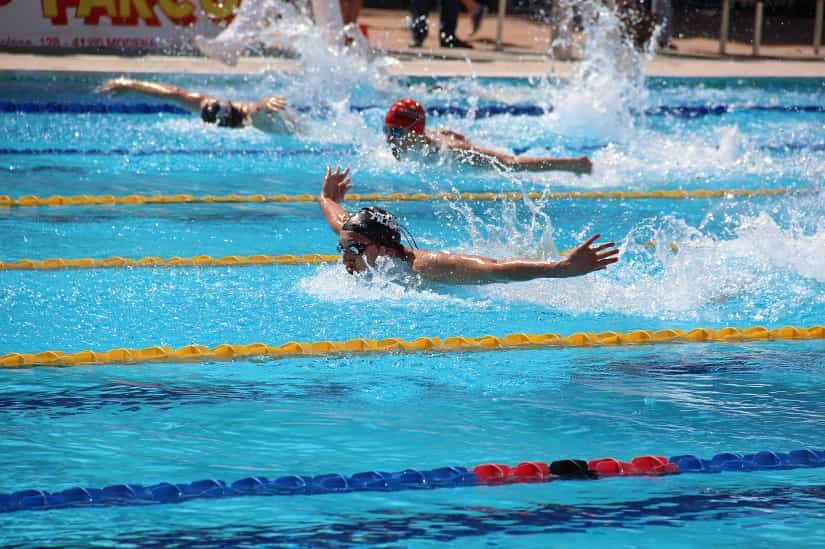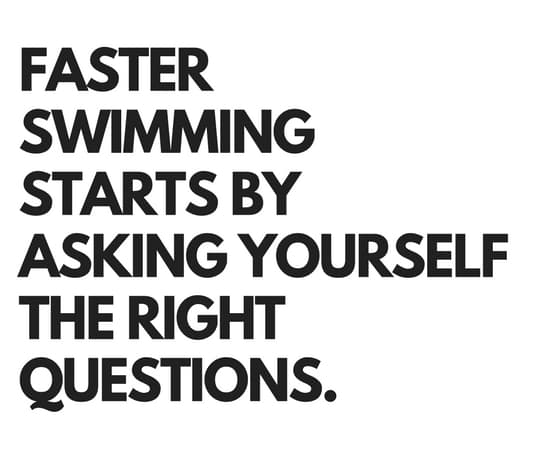Turn up the consistency in your swimming with these three simple and powerful questions to maximize your mindset.
It happened.
Again.
Not even again, but yet again.
You walked out onto the pool deck, full of energy, hope and determination to really give your best in practice. That threshold set? The descending 1000s? They were gonna get it real good.
But then it happened. You don’t even know exactly what it was, or why it happened. But you certainly know how it felt. It was heavy, disappointing, taking the wind out of your big goals in the pool.
Your expectations of “today is the day” get dashed and you find yourself hoping that tomorrow will be the day where you really start to improve your swimming.
That night you left the pool, bag slung over your shoulders, eyes down and shoulders rolled forward.
Maybe tomorrow will be the day your swimming levels up.
Turning around your swimming starts with asking the right questions.
This experience is common. I know because it happened to me more times than I can count.
On top of that, each day I get emails from swimmers, some just like you, who want to fix their swimming and training, but have a hard time pinpointing exactly what’s wrong, which makes the problem doubly-infuriating: without knowing what to fix we don’t know what to do to fix things.
So what do we end up doing?
We keep roller-coastering through our swim workouts, hoping that today will be one of the good ones without ever really getting to the crux of why those good workouts happen and more frustratingly, why they don’t.
If you are up to your chlorinated ears with having uneven swim practices and races, and want to get down on figuring out what it’s going to take to hit the apex of your abilities with more consistency, here are three things to start asking yourself.
1. Where do things fall apart for me in training?
We are creatures of consistency and comfort.
You know this already, even if just on an intuitive level: When things go wrong, it’s because we are making the same mistakes. When things go well, it’s because we do the same things that promote better results.
Don’t overthink this question: pick out the 2-3 spots in practice where you fall apart mentally.
- It could be the moment coach writes up a really tough workout.
- Or halfway through the main set, when thinking about all that is still to come leaves you feeling deflated.
- It could be when one of your teammates starts outperforming you, leaving you feel bummed and unmotivated to complete the practice at the best of your ability.
We each have our own hang-ups; the key is having the self-awareness to be, err, aware of them.
2. What are the feelings and thoughts I have when things are going well for me in practice?
Our emotional state directs our physical response. Read that sentence again. The way we feel about something dictates how we are going to respond to it.
Think that set is stupid and pointless? You are going to sandbag it.
Think that doing kick is a waste of time? You are going to mail in your effort.
The reality is that no matter what kinda of silliness your coach writes up on the board, there is something you can do to improve.
Look: I’m not naïve enough to think that we can sugar-coat every last set. That hard set or workout is still going to be really hard. It’s still going to hurt. But whether you think the set is impossible or pointless, there’s always something you can be working on, no matter how stupid you think the set is.
Go back to your database of workouts and write out a few sentences on what your mindset was like when you were crushing the pool. Confidant? Relaxed? Not stressed? Agitated? Focused on technical excellence? Staying mentally in your own lane?
Remembering what your mindset is like when you are slapping main sets around is helpful because it gives you a clear and personalized idea of what promotes high-performance training.
3. What was the race of my dreams like?
One of my favorite mental training exercises to do with swimmers is this painfully-simple task: write out the best race you’ve ever had and what you felt and thought.
What you end up writing can be a mash-up of the last time you surprised yourself in competition and your “dream” race. Don’t write times, results, placings or even a word about the competition. This exercise is all about what you experience.
Doing this little exercise provides you with some powerful intel:
- You learn what emotional state results in your best performances.
- It gives you cues and self-talk to use in practice so that you can replicate the circumstances for epic swimming more consistently.
- You learn what uniquely works for you; every swimmer’s ideal emotional state is different. Going level ten intensity before a big race or main set might work for a teammate, but not necessarily for you.
- You figure out what to focus on while you are swimming. During practice and competition your focus plays a big role on directing your energy.
This kind of journaling is hilariously awesome: it gives you a sense of distance and objectivity from your swimming that helps you understand exactly what powers your high-performance swims. Giddyup!
The Next Step
The mindset you carry with you into the pool each day dictate how things go for you in the water.
Most swimmers will leave their workouts up to how they feel that day, but this is straight-up amateur hour: the elite and pro swimmers understand that how we feel is predicated on how we are thinking.
They know that thoughts and mindset are self-fulfilling prophecies.
If you think that your workout is going to be crap, than it will be. If you go in with a mindset that you are going to focus on swimming really well, than more often than not, that’s what is going to happen.
Want help with your mindset? Check out our powerhouse mental training book for competitive swimmers, Conquer the Pool: The Swimmer’s Ultimate Guide to a High-Performance Mindset by clicking here.















